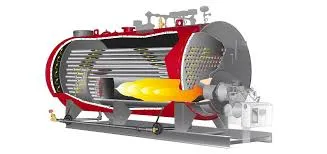
Oct . 12, 2024 13:27 Back to list
Thermal Fluid Boilers for Efficient Heat Transfer Solutions in Industrial Applications
Understanding Thermic Fluid Boilers Efficiency and Applications
Thermic fluid boilers, also known as thermal fluid heaters, are specialized heating systems designed to transfer heat through a liquid medium, typically a thermic fluid. This type of boiler is essential in industrial processes that require heat at elevated temperatures, often exceeding the boiling point of water. Unlike conventional steam boilers, thermic fluid boilers operate on a different principle that allows for efficient heat transfer and improved energy utilization.
How Thermic Fluid Boilers Work
Thermic fluid boilers utilize a heat transfer medium, which can achieve significantly higher temperatures than water while maintaining low pressures. The design of these boilers allows the thermic fluid to circulate through a closed loop system, absorbing heat from the combustion of fuels such as natural gas, oil, or biomass. The heated fluid is then circulated to various heat exchangers in the process, providing the necessary heat for applications like drying, heating, or further processing materials.
The fluid typically used in these systems is a specially engineered synthetic organic compound, which has a high thermal stability and low viscosity. This ensures efficient flow and minimizes energy losses. As the fluid circulates, it returns to the boiler to be reheated, creating a continuous and efficient loop.
Advantages of Thermic Fluid Boilers
Thermic fluid boilers offer several advantages over traditional steam boilers
1. High Efficiency These boilers can operate at higher temperatures without the high pressures associated with steam boilers, leading to greater energy efficiency. 2. Reduced Risk of Scaling The use of synthetic thermal fluids significantly reduces the risk of scaling and corrosion compared to water-based systems.
3. Versatility Thermic fluid boilers can be utilized across various industries, including food processing, petrochemicals, textiles, and pharmaceuticals. They can cater to different heating requirements, making them a versatile solution for many industrial applications.
4. Low Maintenance Requirements Due to their simpler design and the physical properties of the thermic fluids, these boilers often require less maintenance than steam boilers, which need regular inspections for pressure and safety controls.
thermic fluid boiler

5. Closed Loop Systems The design of thermic fluid systems allows for minimal heat loss and environmental exposure, with reduced emissions due to efficient fuel combustion and heat recovery.
Applications of Thermic Fluid Boilers
In the industrial sector, thermic fluid boilers are increasingly popular due to their efficiency and adaptability. Key applications include
- Chemical Processing Many chemical reactions require precise heating to maintain reaction rates, and thermic fluid boilers provide a reliable source of heat.
- Food Industry These boilers are used for drying and cooking processes, where consistent heating is critical for quality control in food products.
- Textile Industry In textile manufacturing, thermic platforms help with dyeing, printing, and finishing processes, all of which require controlled temperature environments.
- Pharmaceuticals Accurate temperature control is essential in pharmaceutical manufacturing, making thermic fluid boilers a crucial component in ensuring product quality and compliance with regulatory standards.
Conclusion
Thermic fluid boilers are a critical innovation in industrial heating technology, offering high efficiency, flexibility, and reliability. As industries continue to seek out energy-efficient and cost-effective heating solutions, the demand for thermic fluid boilers is likely to grow. Their ability to maintain high temperatures with low pressure opens new possibilities for various applications, enhancing productivity and sustainability across multiple sectors. As technology continues to advance, these systems will likely evolve further, incorporating smarter controls and improved materials for even better performance.
-
High-Efficiency Commercial Oil Fired Steam Boiler for Industry
NewsJul.30,2025
-
High-Efficiency Biomass Fired Thermal Oil Boiler Solutions
NewsJul.30,2025
-
High Efficiency Gas Fired Thermal Oil Boiler for Industrial Heating
NewsJul.29,2025
-
High-Efficiency Gas Fired Hot Water Boiler for Sale – Reliable & Affordable
NewsJul.29,2025
-
High Efficiency Biomass Fired Hot Water Boiler for Industrial and Commercial Use
NewsJul.29,2025
-
High-Efficiency Biomass Fired Hot Water Boiler for Industrial Use
NewsJul.28,2025
Related PRODUCTS






















